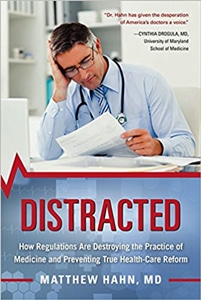By Michael D. Shaw June 26, 2017
Hahn laments that “The once great American healthcare system has fallen seriously ill. Millions of Americans are suffering the consequences.” In the book’s introduction, he lays out the all too well-known symptoms:
- Too many patients have limited or no access to medical care.
- American healthcare costs too much.
- American healthcare is poor-outcome healthcare.
“The practice of medicine, providing care to patients, has been shoved aside, replaced by a sea of distractions.” Thus, the incisive title. In each chapter, Hahn provides exhaustive detail, along with recommendations on how to fix the problems. He throws down the gauntlet early:
“It is not really ‘healthcare’ that is failing—what is failing is the administration of health care. [I]t is necessary to distinguish healthcare, referring to the doctors, the nurses, the diagnostics, the treatments, and the patients, from healthcare administration—referring to the government bureaucrats and health insurance executives and administrators, the bureaucracy they have created, and their heavy-handed and ineffective methods. That is at the root of what is sickening our healthcare system.”
Where the rubber meets the road on how healthcare administration interacts with healthcare providers, is via the universally despised electronic health records (EHRs). Hahn devotes an entire chapter to EHRs, and riffing on the oft-criticized “Meaningful Use” program, he calls it “Computerizing Medicine—Meaningless Use.” As it happens, Hahn was involved in the development of an EHR system, which he uses in his own practice, and that has been commercialized. To be sure, he criticizes EHRs, but during my interview he offered these thoughts (which are covered in the book):
“With good EHR systems, doing the things that I know they are capable of, American healthcare could move forward light years very quickly. To right what is wrong in computerization, we really need a national system. We need to start over. We need to have a competition to find the ‘great usable system’ and make it available to anyone who wants it—at low cost.”
Since EHRs are at the very heart of the system, Hahn’s ideas on this subject are among the most important in the book. Indeed, his two biggest overall precepts are streamlining the payment system, and vastly improving EHRs. He doubts that any reform can occur without both of these taking place.
Other chapters are devoted to health insurance and proposals to measure quality of outcomes. As to quality metrics, Hahn is on-board, but notes that must change. Is it fair that he can be judged on how well he controls the blood pressure of elderly patients, when their insurance denies coverage of basic generic blood pressure meds? How fair would it be if the meds were covered, but they did not take them on a regular basis? Indeed, what about the entire aspect of patients actually taking some ownership in their own health? A physician can only browbeat so much.
In an avalanche of books telling us what is wrong with healthcare in America, Distracted is one of the good ones. I give it my strongest recommendation.

No comments:
Post a Comment